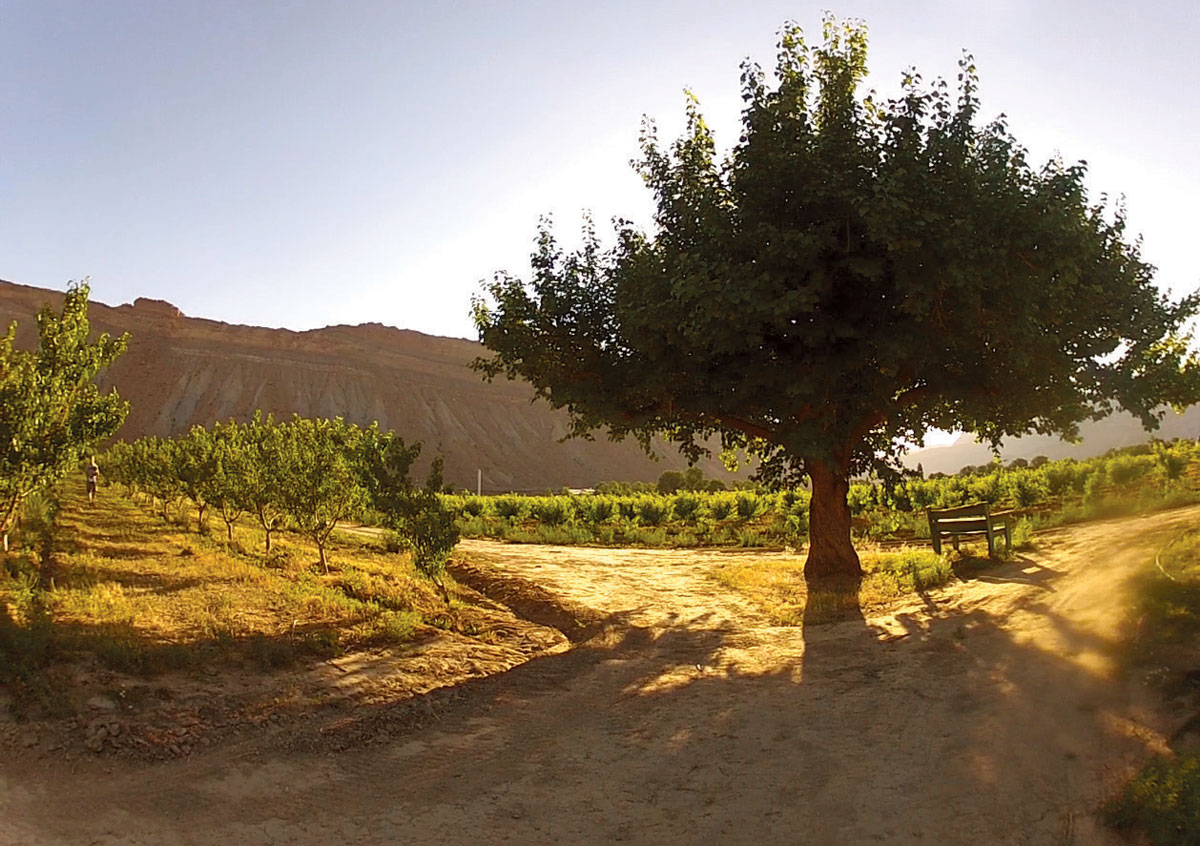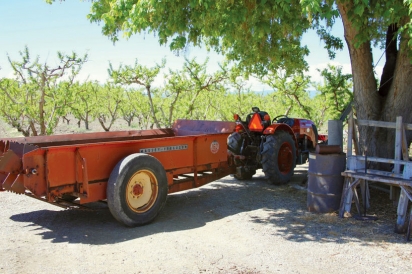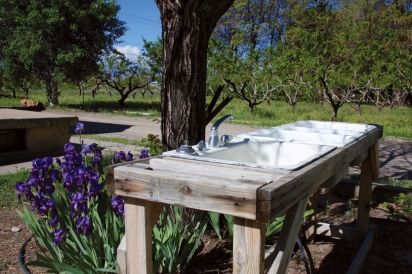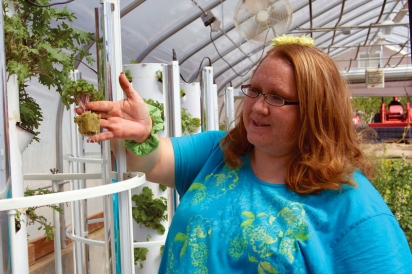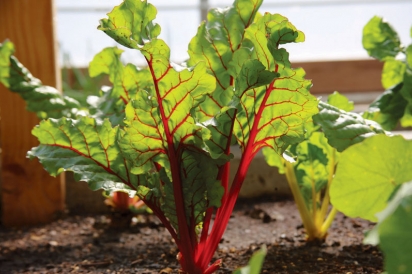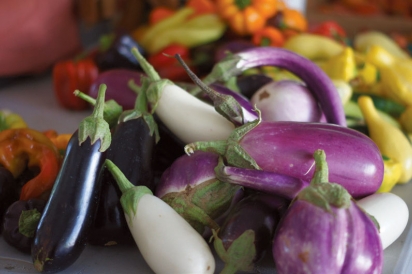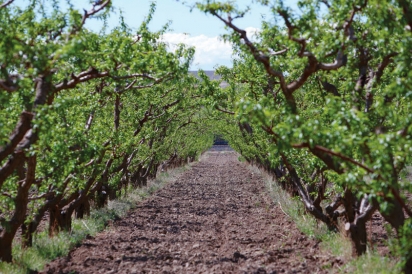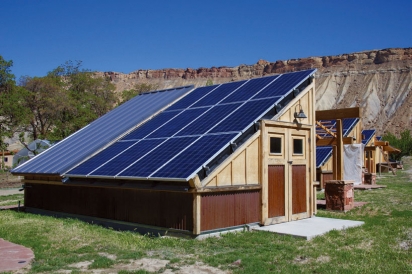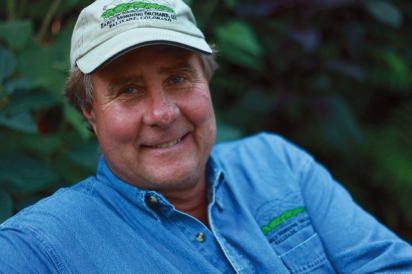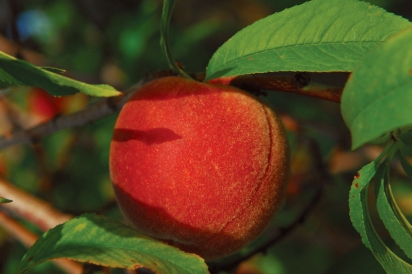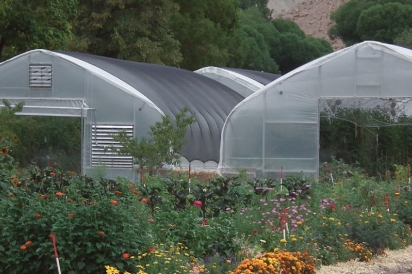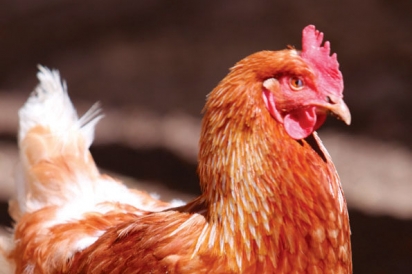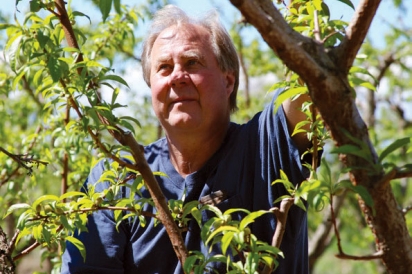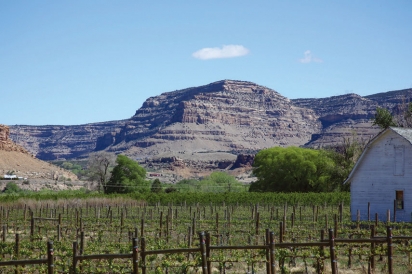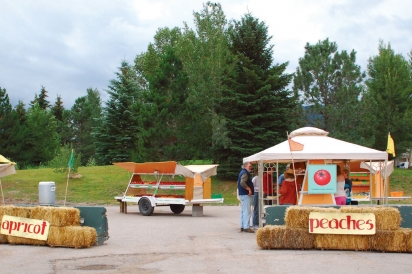Suited for Farming: Putting Down Roots at Early Morning Orchard
Ex-architect puts down roots at Early Morning Orchard
When you pull off Interstate 70 at the Palisade exit, you are immediately in farm country. Vineyards and orchards line both sides of the road. Farm equipment is parked in driveways and at the edges of fields. Signs at the first four-way stop point the way to fruit and vegetable stands in every direction.
Turn right at that intersection and drive a half mile or so down the two-lane county road and you’ll see on your right an old yellow farmhouse and a peach orchard. Parked in the driveway are a few trucks with the name Early Morning Orchard and its logo, a smiling peach, painted on the side.
Early Morning Orchard has in recent years become a major supplier of locally grown organic fruits and vegetables to the Roaring Fork Valley. Owner Skip Doty has a year-round staff of five and a larger seasonal staff to supply 40 wholesale accounts, from a pizza joint in Moab to a woman in Basalt who likes her produce delivered. Doty has several retail outlets as well, including vegetable and fruit stands at Buttermilk, El Jebel, Glenwood Springs and, starting this year, in Basalt, plus he has stands at weekly farmers’ markets all over the region. Early Morning Orchard also sells to two grocery stores: Moonflower Community Co-op in Moab and the Carbondale Community Food Co-op.
“I feel much more comfortable now that I have small accounts from Moab to Aspen,” Skip says. “I have a neighbor who says he’d rather have ten $100 accounts than one $1,000 account, and I agree.”
A striking thing about Early Morning Orchard is its size. It’s not really that big: a narrow, five-acre parcel where all of the vegetables and flowers and some of the fruit is grown, and a 10- acre peach orchard a mile away. That’s it. (There’s another 10½- acre plum orchard that Skip put under conservation easement, but it is not producing much right now.)
The fruit trees—peaches, pluots, apricots and plums—on the smaller parcel take up more than half the land. Vegetables and herbs grow year round in the four greenhouses. Outside, rows of kale, chard, lettuce, carrots, green beans and potatoes are planted just about everywhere they will fit. Along the western edge of the property, there’s a tall trellis and flower beds.
Skip’s year round employees typically have farming experience, and certainly need to be willing to work hard. In the summer, days can begin before 6 a.m. and go past midnight if there’s a big order to pack. In the winter they keep the greenhouses growing. He’s been lucky to have employees who tinker and experiment, which has helped turn the greenhouses into a vital part of the overall operations.
One of the greenhouses is set up for starter plants, where in April popcorn was growing, along with lettuce, kale, asparagus and carrots. There is a hanging trellis in another greenhouse, which allows for even more to be planted.
Another thing that stands out at that five-acre plot is the solar array along the property line to the east. Skip, in a testament to his prior career as an architect, designed and built sheds, small buildings really, with massive south-facing roofs to place the solar panels. One of them is a supply shed. Building two is all windows and solar panels, and slated to become the office. The third will be a place for the public to hang out, with a red flagstone patio alongside. And the fourth solar shed, closest to the greenhouses, is a refrigerated packing room where Skip and his staff pack freshly picked produce for delivery each day.
“My goal is to get these five acres entirely off the grid and using renewable energy,” Skip says. “It’s the most-energy intensive operation I own.” Between the solar panels and the geothermal energy that Skip tapped to heat his greenhouses in the winter, it’s looking quite possible.
At the 10-acre orchard, things are a lot quieter. Jim Reid takes care of the trees and keeps all of the equipment in good working order. Thirty-six hundred peach trees with multiple varieties—New Haven, Santa Rosa, Sun Crest, Crest Haven and others—cover most of the property.
“Just about every peach out here is sold,” Skip says. “I couldn’t say that two years ago, but everything has changed with the fruit stands and other customers we have now.”
There’s also a fenced yard filled with hens and a few refrigerators in the nearby barn filled with eggs. Skip hasn’t quite figured a way to sell the eggs commercially yet, so you won’t find them at any of his stands this summer.
From Architect to Farmer
You might say Skip Doty’s gone to seed. His clothes are a little dusty and there is dirt under his nails. He smiles as he tells you about performing the most humbling tasks, like picking weeds or cleaning the sticks and waste out of flower beds. Or getting up at 3 a.m. to help employees prevent his orchards from freezing.
If you get him talking about Early Morning Orchard, Skip’s imagination begins mixing with his ambition. Like taking a growing commercial orchard and farm off the grid. Or the purchase of the Buttermilk Fruit Stand in 2013. Or the 30 new wholesale customers he picked up last year, which got him looking into leasing five more acres so they can grow 2,000 more tomato plants, one of the “money crops.”
And then there’s Peachy, a cartoon peach with a big smile, a green baseball cap and a matching pair of tennis shoes. Skip’s smile grows extra big when he talks about Peachy, who is on the side of small boxes—the Peachy Pak—that can be filled with peaches or any other produce. They seem just about right-sized for anywhere from one person to four, and will come in handy this summer at the stands and weekly markets.
“Other growers envy Peachy. They wish they had thought of him,” Skip says, like a proud father.
Agricultural entrepreneurship comes naturally to Skip. His father was a forest ranger, and his great-grandfather a farmer. Trees and farms are in his DNA. “That’s the easy part, to be thinking about little things in this business all the time. Also, I love meeting with people.”
Fortunately he has Julie Boscia on staff to help him out with the business and communications. As farm manager she manages all of the orders and keeps the daily communications with customers and vendors in line with the business.
“One nice thing about Julie,” says Skip, “is that she is much more digital than I am.” Actually, that’s an understatement: Skip doesn’t have a cell phone or a computer these days.
“Communication is a big part of our business,” Julie explains. “We really have gotten it dialed in so we know what we’re taking to market and how much we’re going to make. Our consistency on the pricing is one of our biggest assets.”
Skip used to spend most of his time on the phone or in front of a computer. He was an architect in Aspen, designing high end residences with award-winning colleague David Finholm. When he was working, Skip was either at a desk or cajoling building officials on behalf of the firm’s clients. When he wasn’t working, Skip was in the woods. “‘When I retire,’ I said to myself, ‘I’m going to be out in the trees. I’m going to farm. I’m going to be dirty.’”
So in 2003 Skip and his wife, May, who has since passed away, bought a 10½-acre plum orchard in Palisade.
“It really was something to be out there in those aged plum trees. It was like an ancient forest,” he recalls. “For a few years there were these owls nesting in the trees. I’d see the baby owls out there, when I was spreading sea kelp around the orchard.”
In the spring of 2003, Skip sold his first box of plums to Billie Herman, who ran Valley Fruit Stand near the highway. “I took them a couple of boxes of really good Redheart blood plums and Billie told me what she was going to pay for them. All I could say was ‘Oh, yeah, that sounds like a good idea.’”
In the years since May’s death in 2006, Skip has achieved his lifelong ambition to become a full-fledged farmer. In 2009, he bought the five-acre orchard with the yellow farmhouse. In 2011 a band of gypsies (no kidding) showed up and insisted he start growing vegetables, so he did.
“A few of them were really good at farming,” Skip recalls, “but suffice it to say they were young and liked to partake of the vine.”
In 2012, he set up the greenhouses and purchased the 10-acre peach orchard. To sell all that produce, Skip bought the Buttermilk Fruit Stand and began reaching out to restaurant owners up and down the valley. He opened a stand at Eagle Crest Nursery in El Jebel. He is selling produce in Carbondale through the Food Co-op on Main Street. And this year he’ll have a six-day-a-week stand in Basalt, shutting down for the farmers’ market on Sundays.
As the 2015 season takes off, Early Morning Orchard is poised to have fresh fruit and vegetables running up to the Roaring Fork Valley and out to Moab every day. And you can bet that on most days, Skip will be driving one of those trucks or working one of his stands.
“I’m suited for this new career and life,” Skip says.
GO FIND IT!
Early Morning Orchard
3694 G.4 Rd., Palisade
970.438.6004
EarlyMorningOrchard.com
Buttermilk Fruit Stand Returns!
After a one year hiatus, the fruits and vegetables Aspenites have come to depend on are coming back to Buttermilk.
Skip Doty, owner of the Buttermilk Fruit Stand in Aspen and Early Morning Orchard in Palisade, will be selling organic fruit and vegetables this summer in the parking lot at the base of Buttermilk Ski Area. Last year, the stand was located at Cozy Point Ranch so the Aspen Skiing Co. could manage construction at the base of the hill.
Doty purchased the Buttermilk Fruit Stand in 2013 so he would have a place to sell apricots, peaches, pluots, plums and a full plate of vegetables grown on nearly 26 acres in Palisade. He says there are a few things that people ought to know about the stand today:
It’s 100 percent organic. For most of its history, which stretches back three decades, the stand sold both organic and non-organic produce. Skip dropped the non-organic produce when he realized he knew enough organic producers to keep the stand stocked.
Skip and his crews pick Early Morning Orchard peaches and other fruit a week later than most growers, as close to ripe as possible. “My customers want to buy that peach and eat it before they are in their car,” he says. “They want to say ‘Dang, that’s a good peach!’”
Skip does his best to keep prices reasonable. “I’m not out to undercut other growers, but I try to keep things at a fair price.”
Visit Facebook.com/ButtermilkFruitStand for opening date and summer hours.


